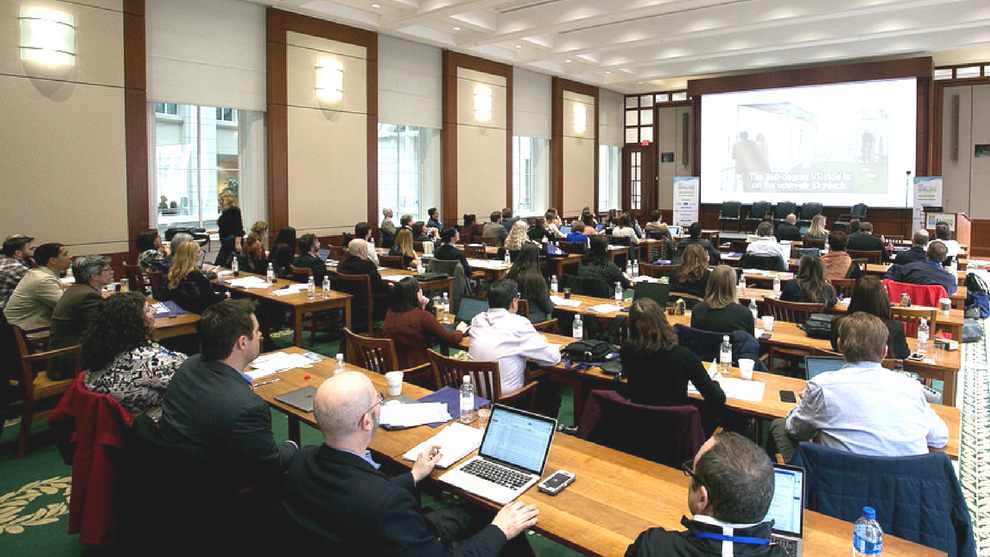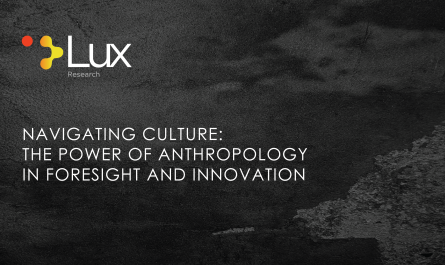A snow storm, a march for life and airport closures kept Washington in the news in the month of March. Despite the disruptions, over a hundred quallies gathered at the Gallup headquarters for what has now become an annual tradition, the Qual 360 North America conference. The two-day event explored the evolution of qual research and its place in today’s disruptive world.
Using Qual to inform Quant
Historically qualitative research has been conducted to rubber stamp quantitative findings. Researchers at Electronic Arts flipped the script when developing their AI chatbot “Amelia”. Derek Franks Global Director of Insights; Worldwide Customer Experience at EA explained how the project was started with qualitative research leading to more insightful and actionable quantitative results.
 To learn what players like about interacting with a chatbot, EA ran several pilot projects. The three-step research project started with analyzing chat logs from pilot projects, creating players and advisors focus groups and eventually testing the quant study with players. Analyzing chat logs revealed Amelia struggled with responses that are “off script” and advisors sometimes repeated verification and didn’t read the notes. Focus groups and online interviews helped understand what types of interactions players are willing to have with a virtual agent.
To learn what players like about interacting with a chatbot, EA ran several pilot projects. The three-step research project started with analyzing chat logs from pilot projects, creating players and advisors focus groups and eventually testing the quant study with players. Analyzing chat logs revealed Amelia struggled with responses that are “off script” and advisors sometimes repeated verification and didn’t read the notes. Focus groups and online interviews helped understand what types of interactions players are willing to have with a virtual agent.
The results of these qualitative findings were quantified to compare and contrast what people are willing to do (or not) with Amelia and to make the Amelia program much more efficient and effective with ‘smarter responses’.
AI, VR – new tech in qual
 David Bauer, partner at Hemisphere highlighted VR has the potential to better tap into intuitive thinking, using decision-making processes as an example. “Consumers want a fluid experience and don’t want to stop”… “most decisions on a shopping trip are driven by gut and intuition. People don’t want to overthink those things”. VR has the ability to create a world where shoppers can step into real life like situations in remote locations, opening up possibilities for researchers to test their subjects interactions in the virtual world, without the costs of setting up a physical experiment.
David Bauer, partner at Hemisphere highlighted VR has the potential to better tap into intuitive thinking, using decision-making processes as an example. “Consumers want a fluid experience and don’t want to stop”… “most decisions on a shopping trip are driven by gut and intuition. People don’t want to overthink those things”. VR has the ability to create a world where shoppers can step into real life like situations in remote locations, opening up possibilities for researchers to test their subjects interactions in the virtual world, without the costs of setting up a physical experiment.
VR has the ability to collect precise movement parameters like eye tracking and interpersonal distance. These virtual reality engagements produce sets of data which can then used to develop new models, training methods, store designs communication and interaction. The possibilities are endless. One could use VR to present back to stakeholders so they can really experience what it is like to be the consumer. This can be an incredibly powerful tool to build empathy and understanding.
Vanessa Campbell, AVP Design Research at Research Strategy Group demonstrated a completed VR study. Vanessa, along with her team were tapped by the Ontario Lottery and Gaming Corporation to develop their new gambling educational program, the result ‘Playsmart’ is a dynamic player environment for players to educate themselves. VR technology was used to design these physical locations uncovering needs, exploring preference, evaluating concepts, ranking concepts, improving ‘best concept’, re-immersion into ‘ideal’ concept.

While VR and mixed reality is the newest technology for researchers to get closer to the consumer in a creative manner, video continues to be a key tool in gaining accurate insights and staying connected with the consumer.
Cara Cosentino, Director of Client and Project Services, Watch Me Think argues a bedrock of qual research, traditional ethnography, is nowadays often seen as too time-consuming, expensive and granular. The consumer-made video is a faster and more efficient way to connect and understand respondents. At the same time video captures and also stores several types of insights in one study.
From cultural framing to daydreams
Technology is no doubt driving a great amount of innovation in qualitative research, however, the human factor is as important as ever. The most advanced AI is currently not able to understand cultural framing, as Rachel Lawes from Lawes Consulting highlighted in her workshop. For example “Often us British folks are ‘mean’ and crack jokes at your expense, then we like you”, technology is not (yet) sophisticated enough to put these kinds of cultural differences into context, so Lawes. Using semiotics and cultural framing in qual research are key to discover these deeper meanings.
Tommy Sintson Managing Director, Qualitative Insights at Maru/Matchbox defines cultural framing as “an approach to understanding humans’ deep-seated emotional needs and situating them in the context of the cultural dynamics that are at play”. Tommy shared a real-life project where his team was tasked with identifying opportunities to launch a ready-to-drink coffee beverage in Latin America. A mixed method approach of multi-day online diaries, IDIs, focus groups revealed the cultural values coffee held in the past and present, including rituals and meaning. Understanding that different kinds of coffee are consumed in different situations helped to launch and position a new ready-to-drink coffee product.
Bianca Abulafia and Sarah Serbun from Kadence International also highlighted the importance of culture differences, drawing on the experience of their global offices. Focusing on research with kids, their presentations not only highlighted international cultural differences but also when children are starting to be socialized in different societies around the world – a crucial aspect to consider when conducting multi-country studies with this target group.
 How could daydreaming and qual research ever intersect? Sandeep Dutta from Kantar TNS captivated the audience in his intriguing presentation tackling just that. Sandeep urged ‘Qualitative researchers to go beyond people’s real lives and explore their imaginary worlds as some consumption drivers may emanate from this space’. Understanding consumers’ desires, needs and wants through their dreams can help researchers really understand the consumer and bring them closer. Sandeep argues consumption behaviour stems from a longing of an alternate life but not necessarily a better one. An online ‘dream catcher’ diary followed by in-depth ‘alternate life’ interviews can reveal the subjects fantasy which can be a driver used to develop products catering to your consumers wants.
How could daydreaming and qual research ever intersect? Sandeep Dutta from Kantar TNS captivated the audience in his intriguing presentation tackling just that. Sandeep urged ‘Qualitative researchers to go beyond people’s real lives and explore their imaginary worlds as some consumption drivers may emanate from this space’. Understanding consumers’ desires, needs and wants through their dreams can help researchers really understand the consumer and bring them closer. Sandeep argues consumption behaviour stems from a longing of an alternate life but not necessarily a better one. An online ‘dream catcher’ diary followed by in-depth ‘alternate life’ interviews can reveal the subjects fantasy which can be a driver used to develop products catering to your consumers wants.
Qual360 2018 brought together experts with unique perspectives and ideas. We walk away understanding emerging technology is constantly reshaping the role of qual researchers and undoubtedly 2018 will be no different but human consciousness is still very much a key driver in the research.
Videos of presentations, as well as the slides, are available in our “event video” section. The next Qual360 conference will take place in Singapore on October 10&11, 2018.










 by
by 


